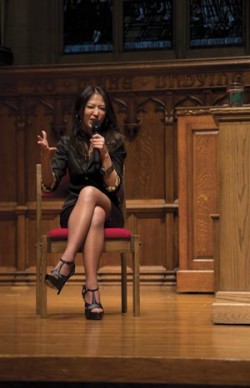Assembly Series
Amy Chua, ‘Tiger Mother,’ shows her true stripes
Yale Law professor Amy Chua interacts with the audience in a Q&A session after speaking about her memoir “Battle Hymn of the Tiger Mother.” The event was organized by the LNYF commitee and held in Graham Chapel on Tuesday, March 6.
And thus began Chua’s hour-long lecture, which at times resembled the trial of a defendant who simply wanted to explain herself and get the jury to see her point of view. At other times, it took on the tone of an unyielding preacher who believed wholeheartedly in her gospel.
“I believe there are many ways of being a good parent,” she said.
Chua’s memoir became a topic of national debate after The Wall Street Journal published an excerpt from her book that detailed her strict parenting methods that included prohibiting her daughters from attending sleepovers or watching TV. In the now infamous passage about Chua forcing her youngest daughter to practice piano, Chua writes, “We worked right through dinner into the night, and I wouldn’t let Lulu get up, not for water, not even to go to the bathroom.”
At the lecture on Tuesday afternoon, Chua protested that many of the people who criticized her had missed the tongue-in-cheek tone of her book that was more a coming-of-parenting story than it was the parenting manual that the press had made it seem.
But Chua never once apologized for her belief that hard work was the key to success.
“My parents having high expectations for me, is the greatest gift that anyone has ever given me. And that is why…I tried to raise my own two daughters the same way my parents raised me,” she said. “If I had to raise my girls all over again, I would do the same thing. Maybe with some adjustments. I’m not saying it’s for everyone. I’m not saying it’s a better way.
“It’s not about achievement or grades at all. It’s about teaching your child that they are capable of so much more than they think and that if they don’t give up and don’t make excuses and hold themselves to a higher standard, then they can do anything they want in life and break through any barrier.”
In her lecture, Chua identified three key differences between the Western parenting style and the Chinese parenting style: self-esteem, choice and creativity.
Chua said that in the West, parents spend an enormous amount of time worrying about their children’s self-esteem and making sure that children feel good about themselves.
“I think that self-esteem is earned. If you want inner strength and resilience, it has to be earned,” she said. “We can assume strength in our children.”
However, there was too little choice and too little freedom in China, with too little room for originality. Chua described kids in China as “less vibrant.” In the U.S., “There are an infinite number of ways to define yourself,” she said. “But the U.S. has to be careful, because there’s also too much choice and freedom to take the easy way out.”
Finally, Chua described creativity as America’s lifeblood and every eastern Asian education system—China, Japan, South Korea—as trying to figure out ways to increase creativity.
“[China] has the harder problem. It’s hard to jumpstart that mentality,” she said. But she also said that the creativity debate got hijacked when people began to ask her whether she wanted her daughters to work hard or be creative. Hard work and creativity, she said, are not mutually exclusive, and, in fact, creativity requires hard work.
At the end of her lecture, Chua left the audience with a final thought.
“I want to ask everyone in this room to think about your own parents, or grandparents…whoever it was that raised [you]. Parenting was about survival and building character…because they knew how hard opportunity is to come by,” she said. “I bet they worked incredibly hard and saw even the chance to strive for excellence as a gift. Child raising is inextricably linked with our nation’s future. At stake is not only our children’s well-bearing but the durability of our nation’s well-being.”
Chua answered questions that had been pre-submitted on Facebook, including questions about how she saw Jeremy Lin’s success, whether hard work can really solve all the problems that adults are faced with, and what advice she had for college students entering the work force who will eventually become parents.
Chua’s visit was sponsored by Lunar New Year Festival (LNYF).
“People misunderstood Amy Chua and think that [her book] is about how Chinese mothers are better than others, but that’s not the message that she is sending. If you just read the hard cover of her book, she talked about how that wasn’t her intention,” junior Rina Matsumoto, co-director of LNYF, said. “She talked about how she was actually humbled by her parental experience.”
Matsumoto also talked about her pleasant experience interacting with Chua.
“I thought she’d be scary, but when I first met her, she was super friendly, and she was actually kind of petite, so she was not intimidating. We went out and had lunch; she really cares about our own experiences, [and] how we were brought up. She was relatable and really cool,” Matsumoto said. “I really enjoyed spending time with her.”
With additional reporting by Wei Yin Ko.

